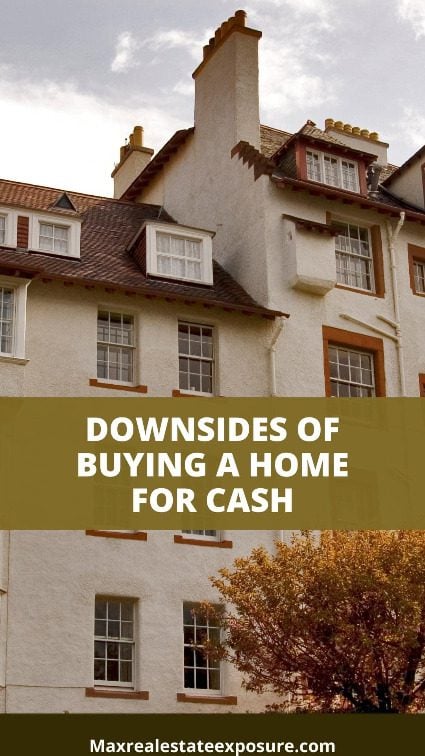The Guide to Buy Houses With Cash
 Is buying a house with cash a good idea?
Is buying a house with cash a good idea?
If you have the money available to allow you to buy houses for cash, is it the best option?
The answers to these questions may not be completely apparent.
While it will make buying the home more straightforward, the decision might not be as obvious as it first appears without the need to deal with a lender.
Being a cash home buyer might not be your best option, even though it will save you money without the need to pay interest on a loan.
There are other things you might need the money for or places where you could spend it that would have a far more significant positive effect on your finances.
Before you buy a house for cash, you need to make sure you know your options. Cash offers might make sense in some circumstances but maybe not in others.
Let’s look at whether buying houses with cash makes sense for you.
What Does it Really Mean to Buy Homes With Cash?
If you decide the buying home in cash option is right for you, it doesn’t mean you will need to bring stacks of bills with you when you sign the documents on closing day.
A cash home buyer is just someone who has enough money to pay the price of the home without a loan. This money could come from the proceeds of a previous home sale, savings, or any other source.
Though, whatever the reason you have sufficient cash to buy a home without a mortgage, there are some attractive advantages.
The Advantages of Being a Cash Buyer
No Monthly Mortgage Payments
When you purchase a home for cash, you won’t have to worry about monthly mortgage payments. Since this usually is most people’s most considerable monthly expense, avoiding it means you reduce your outgoings significantly.
Without a monthly mortgage payment, you won’t be paying any interest to a lender. This will save you a lot of money over a mortgage since a large loan will mean a lot of interest.
No mortgage loan means one less additional expense.
No Mortgage Insurance
When you buy a home with less than 20% down, the mortgage lender will require you to pay private mortgage insurance. PMI is a substantial extra cost that doesn’t even protect you. This type of insurance protects the lender should you fail a keep up with your mortgage payments.
This insurance premium might cost you over $1,000 each year. While you can typically have this charge removed when you reach 20% equity, the FHA loans program doesn’t allow this. FHA loans will require you to remortgage or continue to pay this for the entirety of the home loan.
Sellers and Real Estate Agents Often Prefer Cash Buyers
 A real estate agent will love to see a cash offer! Home buyers who can pay cash often see their chances of accepting an offer increase exponentially.
A real estate agent will love to see a cash offer! Home buyers who can pay cash often see their chances of accepting an offer increase exponentially.
In a competitive market, a cash transaction usually heads to the top of the offer pile in a bidding war. Even in a buyer’s market, buying a house in cash will be looked at favorably.
It gives the seller more certainty if you have the cash to pay for a home without relying on a lender.
If the buyer has the funds to purchase the home, the seller doesn’t need to worry about the deal falling through.
If the seller has agreed to an offer and spent a couple of months waiting to get to closing, it could still fail, thanks to a problem with the financing.
While this is pretty unusual, it could still be a fear in the back of the seller’s mind. A cash buyer doesn’t have his potential downside.
As there are fewer potential problems and stages to selling the home with cash buyers, sellers might be more willing to negotiate on price.
Paying cash might mean that they will be more likely to accept a lower purchase price for the benefit of a faster and easier sale. Beating a cash buyer is hard to do.
Just make sure you’re prepared to provide proof of funds. An excellent real estate agent will ask for this with cash sales.
The only time buying houses in cash becomes less attractive for some sellers is when it is from a real estate investor.
Companies like We Buy Ugly Houses pay cash but only offer a fraction of the property value. See how to sell a house for cash.
Less Closing Costs
On closing day, you will be expected to pay any lender fees. Some of these fees will go to the lender, including discount points, loan origination, and application fees.
There can also be many other fees that the lender will add to your bill. This could include things like underwriting, processing, and document preparation fees. These are all part of a buyer’s closing costs.
All these can add up to thousands of dollars in expenses you’ll avoid when making a cash purchase. With a cash deal, it is still a good idea to pay for a title search to ensure you have a clean title.
One of the things a real estate attorney will do for you is check on these vital parts of a home purchase.
Paying for title insurance is also a smart thing to do. With cash deals, homeowners insurance will not be required, but it could be financial suicide not to have the coverage.
A More Streamlined Closing Process
Without waiting for the lender to go through their processes and underwriting, the path to ownership is quicker. Whereas it can take more than a month for the whole process to be completed when a mortgage is included, it can take just a couple of weeks without.
A faster closing can be a perk to a home seller, which can also be helpful in a hot real estate market with numerous home offers.
There will also be fewer documents for you to check and sign on closing day and not as many things that can go wrong overall.
More Peace of Mind When Buying a House With Cash
If you own your home without a mortgage, your expenses will be significantly lower each month, and you won’t risk losing your home should things go wrong. Your financial situation could change in a heartbeat.
If the economy turns for the worst and you lose your job, you won’t have to worry about foreclosure.
Without mortgage payments each month, it makes it easier to become financially independent. Financial independence is critical the closer you come to retirement. You could be using the money saved to invest for your retirement so that you don’t have to worry about living expenses when you are no longer working.
It Gives You More Options
Without a mortgage, you aren’t going to find yourself needing to remain living in the home because you owe more on the mortgage than the property is worth. You are less dependent on what the market is doing and are free to make your own choices about what happens with the house.
It is easier to choose to rent the home out, for example, if you don’t have any concerns over making sure the rent covers the mortgage payments and the other expenses.
Do the pros of paying cash to buy a home outweigh the cons?Click To TweetThe Disadvantages When You Buy Houses for Cash
Now let’s look at the drawbacks of paying cash for a home purchase.
Tying Up Your Cash
 When you’ve used the majority of your money to buy your home, you don’t readily have the option to access it if you need to.
When you’ve used the majority of your money to buy your home, you don’t readily have the option to access it if you need to.
It won’t be easy if you’ve put it into your home if you need to get your hands on a sizable amount of money.
For some folks, liquid assets are hard to come by if they don’t have much money elsewhere.
While you can sell the property or get a mortgage to release these funds, these aren’t going to be quick options.
If you had instead got a home loan and kept some savings in your account, you could access your money when you needed it without a problem.
Investing The Money Might Provide Better Returns
While you will save a lot by avoiding interest payments on a mortgage, you could earn more by investing the money you would have spent buying the home.
When you use cash to buy your home, you could save on the interest the lender would have charged you for the mortgage.
While there are other costs involved, this will still be considerably less than you could earn if you instead put the money into the stock market.
Though returns from stocks aren’t guaranteed, historical data shows average returns of between 7% and 10%. The difference is dramatic if you compare buying the home outright to investing the same money for 30 years.
When buying a $300,000 home, you could be charged around $200,000 in interest and other fees. But if you invested that $300,000 for 30 years, reinvested the dividends, and didn’t invest further, your stocks could be worth as much as $3,000,000.
While the choice between saving $200,000 or earning $3,000,000 might seem obvious, you need to remember there is a lot more risk in buying stocks. Historical data is no guarantee of future results, and a market crash could seriously affect your outcome.
When there are low-interest rates, the chances are greater that you will earn more money elsewhere. It’s the same argument for not paying off your mortgage early. Looking at current mortgage rates as part of your decision to make a cash buy would be best.
Mortgage Tax Deductions
The mortgage interest deduction is one of the tax benefits of owning a home. Buying a house with cash negates any potential tax deductions with a mortgage.
You can save thousands of dollars yearly on your taxable income if you have a mortgage. When itemizing tax deductions, you can deduct any interest paid on the first $750,000.
However, if you have opted to take the standard deduction, you will not benefit from this. If you itemize your deductions, the cost-saving could be similar to a 1% reduction on your mortgage rate.
There are a few tax credits for homeowners to remember, and this is one of them.
Inflation Works to Your Advantage
If you have a fixed-interest mortgage over 30 years, your monthly payments will remain the same. However, the value of the dollar doesn’t, thanks to inflation.
Inflation causes the price you pay for things to increase gradually over time, but it also leads to increased average salaries. While this gradual change happens, your mortgage payments will remain the same, meaning they will increasingly become less and less of a burden on your monthly outgoings.
However, it could be different if you have an adjustable-rate mortgage.
A Mortgage Forces You to Save
With every monthly payment you make, you are adding to the equity you have in the home. A mortgage effectively forces you into saving, which most people wouldn’t do if left to their own devices.
When you compare the net worth of a renter with that of a homeowner, the differences are apparent. With the average homeowner having a net worth of over $230,000, and an average renter just $5,200, building equity in your home makes a considerable difference to your financial future.
So, Should You Buy Houses for Cash?
Everyone’s situation is different, but the younger you are, the more likely a fixed-interest mortgage will work out better. You’ll likely want less debt and lower monthly outgoings when closer to retirement.
If you are younger and more at ease with risk, perhaps investing the money you could have spent on buying a home will work out better. But whatever your situation, it might be advisable to consult a financial advisor before deciding what to do with your savings.
Buying houses in cash makes sense for some but not for others. Hopefully, you are now closer to figuring out what makes sense for you.
About the Author: The above Real Estate information on buying houses in cash is provided by Bill Gassett, a Nationally recognized leader in his field. Bill can be reached via email at billgassett@remaxexec.com or by phone at 508-625-0191. Bill has helped people move in and out of many Metrowest towns for 35+ Years.
Are you thinking of selling your home? I am passionate about real estate and love sharing my marketing expertise!
I service Real Estate Sales in the following Metrowest MA towns: Ashland, Bellingham, Douglas, Framingham, Franklin, Grafton, Holliston, Hopkinton, Hopedale, Medway, Mendon, Milford, Millbury, Millville, Northborough, Northbridge, Shrewsbury, Southborough, Sutton, Wayland, Westborough, Whitinsville, Worcester, Upton, and Uxbridge MA.


Even though I understand the financial advantages of having a mortgage and investing my money with better rates of return, there is something very satisfying in knowing that I own my home free and clear. (As long as I don’t think too much about taxes and maintenance 🙂 )
You never really own your home free and clear- by virtue of having to pay the government “rent” in the form of property taxes and drainage taxes. Then there are HOA fees. If you do not keep paying these taxes and fees, you can still have your home taken from you.
Just my view, and I a know that some folks prefer having zero debt, but debt can be profitable if the interest is less on that debt than what you are earning elsewhere with that money.
If you are able to get a mortgage (like I have) at a low %, then do it. Invest your cash in something that earns more than that percentage rate and you come out ahead.
Property is usually a very good investment. By land in a hot area like Hamilton County, sit on it for a few years, then sell it – you may double your money in just a few years but you are almost CERTAIN to come out well above a low mortgage rate even after adding the expense of property taxes and some maintenance. However, buying a developed lot can be tricky as property taxes are higher than just buying land.